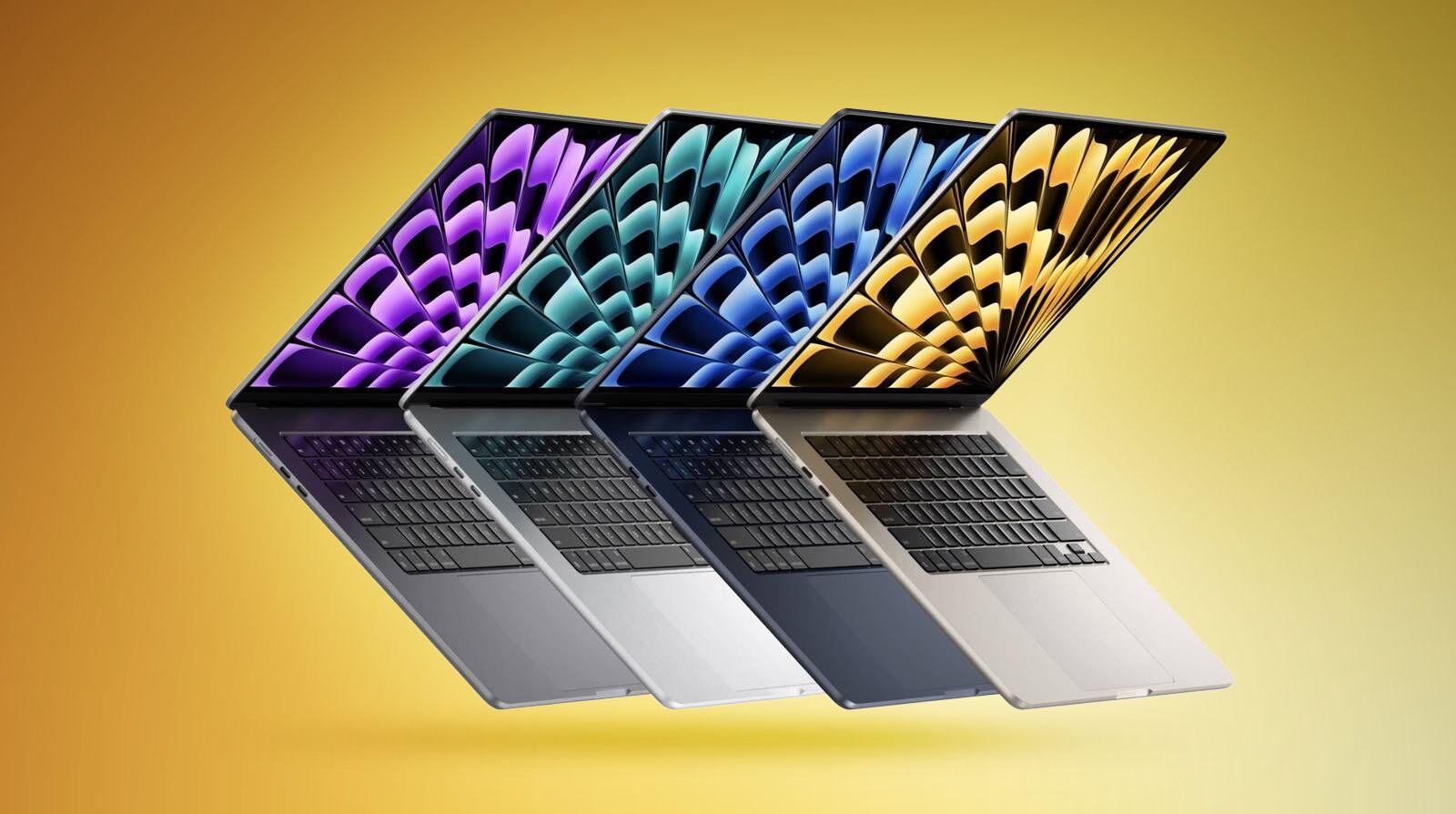[ad_1]
Apple’s MacBook Air has undergone some major changes in recent years, including the switch to Apple silicon, a complete redesign, and the introduction of a 15-inch model, making it all the more important to consider if now is a good time to upgrade or if an older model will suffice for your needs.

Following its latest refresh, Apple discontinued the M1 13-inch MacBook Air from 2020 and the M2 15-inch MacBook Air from 2023. Now, customers can choose between the M2 13-inch MacBook Air from 2022 for $999, and the M3 13- and 15-inch MacBook Airs that were just introduced for $1,099 and $1,299, respectively.
See the breakdown below for each new feature, change, and improvement that was added with each MacBook Air model since 2018 compared to its direct predecessor:
MacBook Air (M3, 2024)
- M3 Chip
- 15% faster Neural Engine
- Support for AV1 decode
- New GPU architecture
- Dynamic Caching
- Hardware-accelerated ray tracing
- Hardware-accelerated mesh shading
- Support for up to two external displays when the lid is closed
- Voice Isolation and Wide Spectrum microphone modes
- Enhanced voice clarity in audio and video calls
- Wi-Fi 6E
- Anodization seal to reduce fingerprints with Midnight finish
MacBook Air (M2, 2022/2023)
- Thinner design with flat lid, rounded bottom edges, and uniform thickness
- 13.6- or 15.3-inch Liquid Retina display
- Apple M2 chip
- Up to 10-core GPU
- Hardware-accelerated H.264, HEVC, ProRes and ProRes RAW
- ProRes encode and decode engine
- Up to 24GB unified memory
- 100GB/s memory bandwidth
- 500 nits brightness
- 1080p FaceTime HD camera
- Four-speaker sound system or six-speaker sound system with force-cancelling woofers
- 3.5mm headphone jack with support for high-impedance headphones
- Bluetooth 5.3
- MagSafe 3
- Fast-charge capable with available 70W USB‑C Power Adapter
- Available in Silver, Space Gray, Starlight, and Midnight
- 1.24 kg (2.7 pounds) or 1.51 kg (3.3 pounds)
MacBook Air (M1, 2020)
- Apple M1 chip
- 8-core CPU
- Up to 8-core GPU
- Media engine
- Hardware-accelerated H.264 and HEVC
- Video decode engine
- Video encode engine
- 16-core Neural Engine
- Up to 16GB unified memory
- 62.5GB/s memory bandwidth
- Wide colour (P3)
- Image signal processor with computational video
- Up to 18-hour battery life
MacBook Air (Intel, 2020)
- Up to Intel Core i7 processor
- Intel Iris Plus Graphics GPU
- Up to 2TB storage
- Magic Keyboard
- Bluetooth 5.0
- 1.29 kg (2.8 pounds)
MacBook Air (Intel, 2018)
- Tapered “wedge” design
- 13.3-inch Retina display
- Up to Intel Core i5 processor
- Up to 4-core CPU
- Intel UHD Graphics 617
- Up to 16GB memory
- Up to 1.5TB storage
- Butterfly Keyboard
- 400 nits brightness
- Full standard colour (sRGB)
- 720p FaceTime HD camera
- Stereo speakers
- 3.5mm headphone jack
- Wi‑Fi 6
- Bluetooth 4.2
- Up to 12-hour battery life
- Available in Silver, Space Gray, and Gold
- 1.25 kg (2.75 pounds)
M2 MacBook Air users have very little reason to upgrade to an M3 model unless they need absolute peak performance and don’t want to buy a MacBook Pro, or perhaps if they purchased the 13-inch machine in 2022 and are now interested in the 15-inch M3 model.
Most M1 MacBook Air users will stand to benefit from upgrading to the M3 model, especially if they are looking for a bigger screen and opt for the 15-inch model. These users would gain a much more modern design, a larger and brighter display, better performance, faster memory, a 1080p camera, improved speakers, MagSafe 3, fast-charging, and more. Nevertheless, some M1 MacBook Air users may be better off waiting for the next major refresh if they are still happy with the machine, and upgrading is not essential.
For those who have an Intel-based MacBook Air, either of the generations currently on sale represent a highly worthwhile upgrade spearheaded by Apple silicon for a major performance improvement and upgrading is recommended, with many of the above upgrades quickly stacking up.
[ad_2]
Source Article Link

